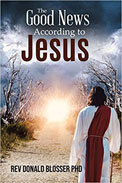
 |
Author and pastor Blosser examines Christian scripture to offer a fresh, credible viewpoint of the underlying purpose of the mission of Jesus of Nazareth. Looking at the earliest beginnings of Jesus's ministry, Blosser notes that while John the Baptist proclaimed that a "New Age" was coming, Jesus said that it had arrived. Throughout his life, Jesus acted and taught in such a way as to implant this idea strongly in the minds and hearts of his followers. This important factor, Blosser asserts, stands in contrast to what many Christians have been taught.
Much of what is considered doctrinal Christian truth, particularly in evangelical, fundamental Christian sects, is based around the central idea of Jesus's death by crucifixion as atonement for the sins of mankind. According to the author, one reason this misinterpretation of Jesus' mission developed and was codified over the centuries is found in the significant role of Paul in creating—or recreating—the story of the master's life. Paul needed to explain the manner of Jesus's death, to transform it into "a divine act of salvation" and remove the stigma of Jesus as an enemy of the existing state and rabbinical structures. This, the author believes, has led to the inculcation of the idea that the path to salvation is inextricably linked to Jesus' death and resurrection, rather than on the totality of his life, during which he spoke of the need of all people to repent (turn away from sinful actions) and renew their lives in the knowledge of God's present and abiding kingdom.
The author envisions a shift in focus, away from the crucifixion and instead on conversion and faithfulness to Jesus's life and message. In doing so, Christians would experience the New Age of God's love that Christ proclaimed, renouncing former sinful tendencies and committing to a life of peaceful, honest caring for others, such as feeding the poor, housing the homeless, and caring for the sick and elderly.
Blosser, a Mennonite pastor and the author of a variety of religious materials, brings to this work considerable research and critical thinking. His quotations include both biblical sources and modern scholarship. He offers descriptions of certain biblical passages with enlivening interpretations, always reminding the reader that Jesus never hinted at the fact that everything would be explained by his death. Instead, he lived and spoke in a way that calls us to be healers and peacemakers. Blosser even presents the radical belief that one can act in these spiritually guided ways "regardless of their religious identity here on earth." He proposes the idea of using heavenly standards to guide our actions here and now, rather than continually preparing ourselves for getting to heaven. Churches could become safe havens for all, gathering places for those who have understood and wish to perpetuate an encompassing vision of Jesus's message by providing not only worship but direct care, education, and other community services. Blosser's well-considered ideas and diligent attention to scriptural fact should be read and discussed by spiritually minded persons or groups either within or outside the established church.
RECOMMENDED by the US Review